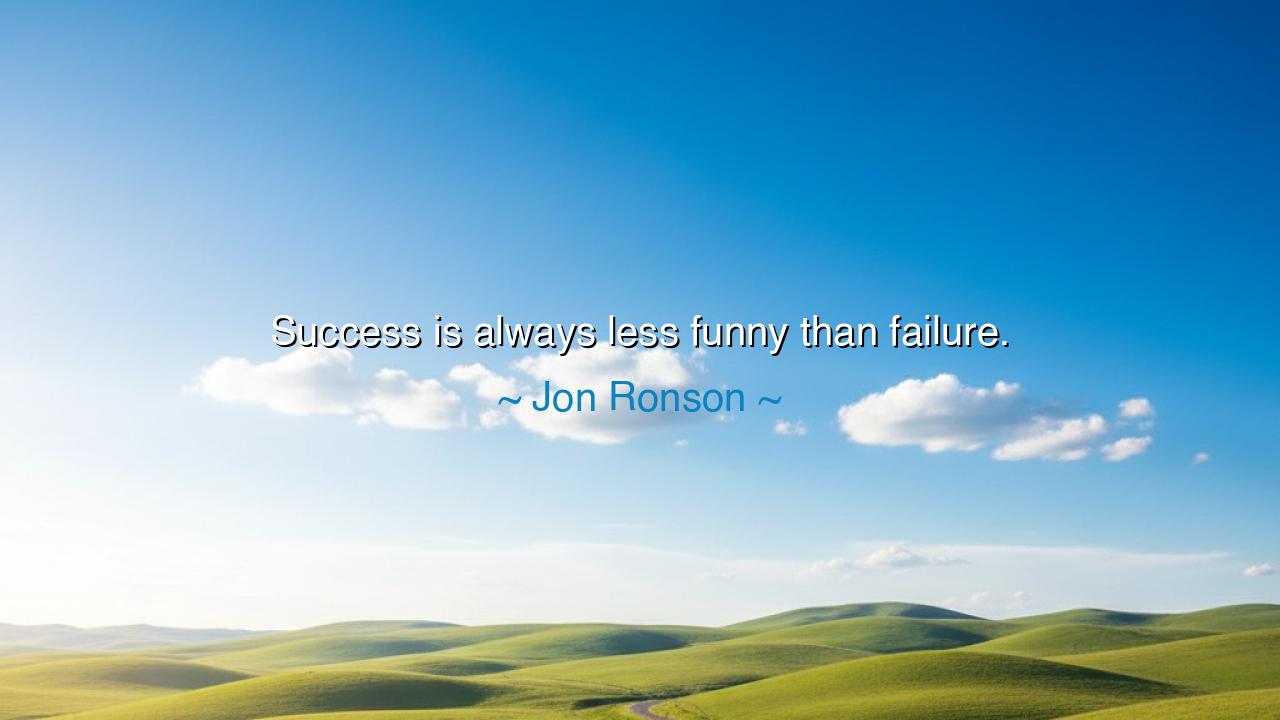
Success is always less funny than failure.






Host: The quiet in the room feels almost reflective, as the last rays of light from the day fade away. Jack, his gaze fixed on the floor for a moment, is clearly reflecting on Jon Ronson’s words: "Success is always less funny than failure." Jeeny, sitting across from him, watches him closely, sensing that the quote has sparked a deeper thought within him.
Jack: (his voice thoughtful) "You know, Ronson’s quote really stands out. 'Success is always less funny than failure.' It’s like he’s saying that failure, in its messiness, is more relatable, more human, and somehow, more entertaining than success. Success seems so polished, so perfect, whereas failure—well, failure exposes our vulnerabilities, and those imperfections are what make things funny. There’s a certain authenticity to failure, don’t you think?"
Jeeny: (nodding gently, her voice understanding) "Exactly. Failure gives us permission to laugh at ourselves. When something goes wrong, it’s often unexpected, which makes it more relatable and, in a way, more human. Success can feel almost distant, like something we’re supposed to attain, but failure—failure is what connects us all. It’s real, it’s messy, and often, it’s where we find the humor because we can recognize ourselves in it."
Jack: (with a chuckle, his tone lighter) "Yeah, it’s interesting because when we succeed, we tend to distance ourselves from the reality of the situation—it’s like we’re trying to hold onto this perfect image of achievement. But failure? That’s when the real stories come out. That’s when people can laugh about the struggles, the awkward moments. Success feels refined, but failure—failure is often raw and real, and there’s something more genuine in that."
Jeeny: (smiling, her voice gentle) "Yes, and I think part of it is because failure gives us a chance to learn, to grow, and even to fail again. It’s full of potential, even if it’s uncomfortable. But success—success can be more static. It’s the destination, but it’s not necessarily where the magic happens. The humor, the lightness, is in the messiness of getting there. It’s in the trials, the errors, and in the moments where things don’t go as planned."
Host: The quiet between them seems to grow, as if they’re both settling into a deeper understanding of Ronson’s insight. The night outside is now fully settled, and inside the room, Jack and Jeeny have embraced the truth that failure, with all its imperfections, holds a unique kind of truth and humor that success can’t always capture.
Jack: (with a small smile, more relaxed) "So, maybe it’s okay to embrace failure a little more, especially if we’re willing to laugh at it. It’s not the end of the road—it’s part of the journey. And in a way, it’s those flawed moments that make life more interesting. They’re the ones we remember, the ones we share, and the ones that make us feel connected to each other."
Jeeny: (nodding, her tone warm) "Exactly. Failure teaches us that it’s okay to not be perfect, to make mistakes, and still keep going. And it’s those imperfections that make life more colorful and, in many ways, more real. It’s the mess of it all that we can laugh about, that we can celebrate, because it’s what makes us who we are."
Host: The conversation lingers in the air, a soft recognition that failure, in all its rawness, is where we often find the most humanity, the most humor, and the most connection. The room feels lighter now, as Jack and Jeeny sit in the stillness, understanding that success may shine, but it’s in the failures where the true story lies, waiting to be told. The light from the window has faded, but the clarity of their thoughts continues to glow in the quiet room.






AAdministratorAdministrator
Welcome, honored guests. Please leave a comment, we will respond soon